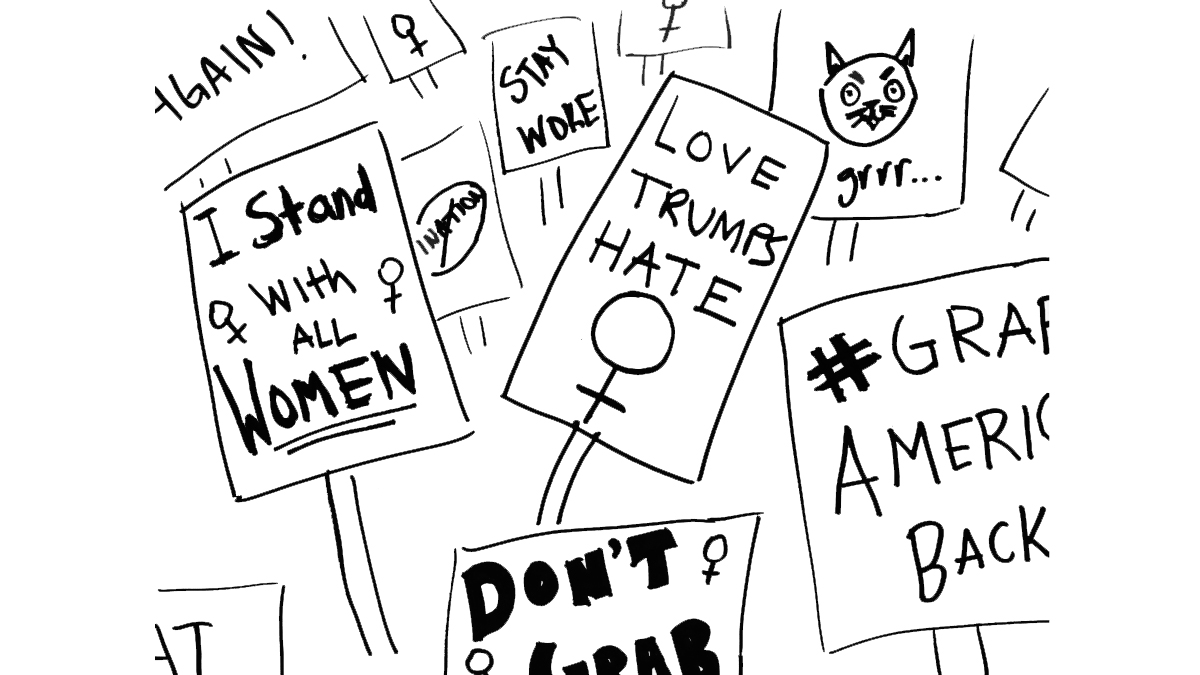 Sam Podgurny
Sam PodgurnyThey came in twos and threes and fours. People of different genders, sexual orientations, ethnicities, and races congregated at the Alberta Legislature on January 21st, protesting equal rights for women at the Women’s March.
Amongst colourful signs and waving limbs, a crowd of civilians banded together in one united voice, screaming “Enough is enough!” Not even a month into 2017, and people are still fighting for equal rights.
The Women’s March was more than a small-scale protest — it was a movement. What started in Washington spread like a necessary virus to countless cities across the world, everyone waving their angry fists at the same leader.
In an act of solidarity that will undoubtedly spark a wave of more to follow, it was not only refreshing but empowering to see people standing up to advocate for issues whose resolutions are long overdue. Is there something about large groups of civilians that gets our hearts racing and our passions flowing? Is it the countless bodies, pressed against each other, fists clenched and cheeks flushed, yelling about something that deserves to be yelled about?
The photos that emerged from marches across the globe were enough to stir emotions in anyone who saw them. Looking at the numerous bodies in the speckled public squares and streets across the world is inspiring. Yet despite the sense of community, you wonder what the effectiveness of such rallies are: does ranting about equal rights and feminism really change anyone’s opinion of it? Does the action of rallying really qualify as meaningful attempts at change? Is it worth standing outside in the freezing cold to listen to the same phrases being shouted, watching the same signs as they are hoisted to the sky?
One of the keys to success is repetition. I would agree that the only way for the many voices to be heard is to keep yelling, to keep protesting, and to keep connecting. Power is always felt in numbers. If you don’t yell about it, who will?
One way to implement change is by talking (and complaining) about it. Now the question remains: will the issues surrounding feminism, human rights, abortion, sexuality, gender and the like ever be addressed? Or is this just one march of many more to come?





If you want to march for women’s rights and human rights, why don’t you march against the brutal female and homosexual oppression under Sharia law in middle Eastern countries?
Did I miss something? Do women and men not already have equal rights in the US?
Yep you definitely missed something lol
Care to give an example? If men are actually afforded legal rights that women are not, then I’m right there with you.
You’re already paid more, and women’s plumbing being far more complicated, and we have to pay more for insurance. And when was the last time you had a congressional hearing over whether you needed female approval to take Viagra? Women constantly have the opposing sex wanting to regulate anything we do with our own bodies (including merely taking birth control to regulate cycles or for complicated lady issues like endometriosis or PCOS). That’s not equal.
The gender “wage gap” argument is without evidence. Also, you can do what you want with your own body. What’s being regulated here is the killing of babies. Stop being ridiculous.
Men earn more than women because of different jobs, hours worked, etc. your describing a situation which is not equitable, rather than unequal. Moreover, the New York Times has reported that in the top 150 city’s in the United States, young women are out earning young men (when you control for jobs and marital/parental status). I have no idea what you mean by “women’s plumbing being far more complicated” but on the insurance point you’re just wrong. Men pay more for nearly all types of insurance, except housing in Ontario, (a 1% gap exists against women, but considering the 20%+ gaps that exist in life insurance that seems like a moot point). As for the congressional hearings objection there’s a lot to unpack there. First, congressmen and women are elected, the majority of voters are women, so your attempt to label congressional hearings as deciding whether or not men approve of something is rather silly. Furthermore, roughly half of women are pro-life (that seems to be what you’re implying by the “own bodies” comment) so framing that as a gendered conflict is absurd. The abortion debate is not about whether or not you have the right do what you want with “your body”, it is about whether or not an unborn baby has the same rights as anybody else, and whether or not you can terminate their body. The reason you need a prescription for Birth Control is because it is a hormone therapy drug, all forms of hormone therapy require a prescription regardless of whether you’re a man or a woman. It turns out the medical community thinks it would be a bad idea for everyone to have the ability to self-diagnose and take hormones which can drastically alter someones body and mind. This apply’s to all, regardless of what’s between your legs: that is equality. Viagra is not comparable to Birth Control, they have nearly no medical equivalence and are only cosmetically entangled. The affects of Viagra are no where near as serious as that of HT drugs like Birth Control.